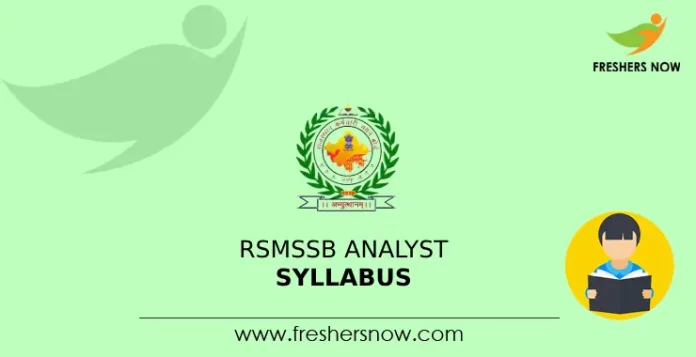
RSMSSB Analyst Syllabus 2025 PDF Download & Exam Pattern: The RSMSSB Analyst Syllabus 2025 is now available for candidates preparing for the exam. This syllabus is very important for the candidates who are applying for the Analyst/ Programmer position. The selection process involves based on written examination, scaling/ moderation/ normalization.
★★ Practice Aptitude Questions & Answers ★★
★★ Practice English Questions & Answers ★★
★★ Practice GK Questions & Answers ★★
RSMSSB Analyst Syllabus 2025
The Exam pattern for the RSMSSB Analyst Exam 2025 includes various subjects and tests the comprehensive abilities of the candidates. The candidates need to understand the exam pattern thoroughly, which includes subjects like Reasoning Test, Numerical Analysis, General Knowledge, and System Analysis & Design each carrying a weightage of 100 marks with a duration of 2 hours.
RSMSSB Analyst Syllabus 2025 – Overview
| Latest RSMSSB Analyst Syllabus 2025 | |
| Organization Name | Rajasthan Subordinate and Ministerial Services Selection Board (RSMSSB) |
| Post Name | Analyst/ Programmer |
| Category | Syllabus |
| Selection Process | written examination, scaling/ moderation/ normalization |
| Location | Rajasthan |
| Official Site | rpsc.rajasthan.gov.in |
RSMSSB Analyst Exam Pattern 2025
The candidates who are applying for the RSMSSB Analyst Exam 2025 It is very important for all the candidates to check the syllabus before preparing for the Exam.
RSMSSB Analyst Exam Pattern 2025
| Name of Papers | Marks | Time |
| PAPER-I | 100 | 2 Hours |
| PAPER-II | 100 | 2 Hours |
RSMSSB Analyst Exam Syllabus 2025
The RSMSSB Analyst Exam Syllabus 2025 is provided below. Hence check out the following sections for the RSMSSB Analyst Exam Syllabus 2025.
Paper – I
- Reasoning Test & Numerical Analysis & General Knowledge: Problem-solving, Data Interpretation, Data Sufficiency, Logical Reasoning and Analytical Reasoning. General Knowledge and Current Affairs relating to India and Rajasthan.
- Data Base Management Systems: ER Diagram, data models-Relational and Object Oriented databases.
- Data Base Design: Conceptual database design, Normalization of Primitive and Composite data types, the concept of physical and logical databases, data abstraction and data independence, data aggregation, and Relational Algebra.
- Application Development using SQL: Host Language interface, embedded SQL programming, Stored procedures, triggers and views, Constraints assertions.
- Internal of RDBMS: Physical data organization in sequential, indexed random, and hashed files. Inverted and multi-list structures, B trees, B+ trees, Query Optimisation, Join algorithm.
Transaction Processing, concurrency control, and recovery management. Transaction model properties and state serializability. Lock base protocols, two-phase locking.
Different server multi-user, multiprocess operating systems, and requirements for client interfaces in distributed application environments.
Data Communication and Computer Networks:
- Computer Network Architecture, Circuit Switching, Packet And Massage Switching, Network Structure. Physical Layer, Data Link Layer, Framing. Retransmission
algorithms. - Multiple access and Aloha. CSMA/CD and Ethernet. High-Speed L.ANs and topologies. Broadcast routing and spanning trees.
- TCP/IP Stack. IP Networks and the Internet. DNS and Firewalls. Intrusion Detection and Prevention. Transport layer and TCP/IP. Network Management and Interoperability.
Paper-II
System Analysis and Design
- System concept: Definition and characteristics, elements and boundaries, types of the system development lifecycle, recognition of needs, feasibility study, prototyping, the role of system analyst.
- System planning and tools like DFD, data dictionary, decision trees, structured analysis, and decision tables.
- IPO charts, structured walkthrough, input-output form design, requirement and classification of forms, layout considerations form control, object-oriented Design
- Concepts and methods, Software Life Cycle, and Software Engineering paradigms.
- System analysis: Feasibility study requirement analysis, Cost-benefit analysis, Planning systems, Analysis tools and techniques.
- System Design: design fundamentals, Modular Design, Data and procedural design, object-oriented design.
- System Development: Code documentation, Program design paradigms, Efficiency Consideration.
- Verification, Validation, and Testing: testing methods, Formal Program Verification, Testing Strategies.
- Software Maintenance: Maintenance Characteristics, Maintainability, Maintenance tasks, and side effects.
Software Project Management
- Software Project Management Concept: The Management Spectrum, People, Product, Process & Project.
- Software Process & Project Matrix: Software Measurement Size Oriented Matrixes, Function Oriented Matrices.
- Software Project Planning: Objectives, Decomposition Techniques, Empirical Estimation Model.
- Risk Analysis and Management: Risk Identification, Projection, Risk Refinement, Risk Monitoring and Management.
- Project Scheduling & Tracking, Software Quality Assurance, Software Configuration Management.
RSMSSB Analyst Syllabus 2025 Download Link
| RSMSSB Analyst Syllabus 2025 PDF Download | |
| To Download The RSMSSB Analyst Syllabus 2025 PDF | Download Syllabus |
For more information about the RSMSSB Analyst Syllabus 2025, Follow our Freshersnow.com Website.



